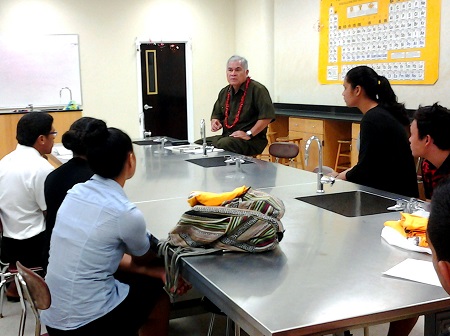
ASPA Director Utu Abe Malae speaks before the HOSA students at ASCC earlier this semester.

ASPA Director Utu Abe Malae speaks before the HOSA students at ASCC earlier this semester.
Utu Abe Malae Speaks to ASCC-HOSA Members
October 27, 2015
By James Kneubuhl, ASCC Press Officer
American Samoa Community College (ASCC) students participating in the Health Occupations Students of America (HOSA) student organization, under the aegis of the American Samoa Area Health Education Center (ASAHEC), gathered earlier this semester to hear from a very special guest speaker, Utu Abe Malae, Executive Director of the American Samoa Power Authority (ASPA). “It is a common practice for HOSA Chapters to have guest speakers,” said ASCC-HOSA Staff Advisor Ms. Sailitafa Samoa, “so I contacted Utu to ask if he would speak to the students on the topic of leadership.”
To share his thoughts on effective leadership, Utu chose the novel approach of focusing on the main principles found in a favorite book of his, “The Four Agreements” by Don Miguel Luiz. Using the actual “agreements” in the Luiz text as a base, Utu expanded on four concepts he feels effective leaders should adhere to, specifically: 1. Be impeccable with your word; 2. Don’t take anything personally; 3. Don’t make assumptions; and 4. Always do your best. He elaborated on each point, gave examples the students could relate to, and provided each audience member with a review of “The Four Agreements” as a handout to enable further pursuit of the book for those interested.
“He also talked about how students should have a positive attitude towards their education and enjoy it, even the prerequisite courses,” shared Ms. Samoa. “He also encouraged the HOSA participants to have an expectation that they will benefit from and develop with each course, and discussed the importance of choosing a career they have a genuine interest in and giving back to the community.” HOSA member Tamara Bailey expressed her appreciation of Utu’s real-life examples. “He discussed the power of education and how far his own investments in it have brought him,” she said. “He also shared his thoughts on the challenges many young adults here face when entering college or the workforce, and commended our school systems for placing a stronger emphasis on Science, Technology, Engineering and Math (STEM) studies in the hope that this will better equip students for their future.” Miss Bailey summed-up Utu’s message as, “the power of thyself, that is - the power to make decisions that will affect our quality of life,” while fellow HOSA participant Motu Sipelii felt he’d gained a clearer perspective on “what to do and what not to do.”
While the choice of Utu as a HOSA guest speaker may have seemed odd to those who wouldn’t equate electricity and running water with healthcare, Ms. Samoa pointed out how ASPA’s work frequently requires personnel schooled in various sciences, which immediately links it to STEM studies. “HOSA also actively engages in STEM,” she said, “and healthcare involves a wide range of careers not only in hospitals and health departments, but in all work situations that involve health and safety. For instance, Utility Companies make sure the drinking water is safe for consumption. Industries and companies make sure their products are safe for the consumer. Equally important is the health and safety of all employees. If an industrial emergency or accident occurs, this will require first responders, emergency preparedness personnel and many other health care professionals. The current concept of health, which promotes both holistic health and healthy employees, in turn increases the economic health of our Territory.”
Nancy Allen of the HOSA National Office explained how it provides students interested in the many aspects of healthcare with an opportunity to expand their awareness as well as get a head start on their training. “HOSA’s purpose is to develop leadership and technical competencies through a program of motivation, awareness and recognition, which is an integral part of the instructional program,” she said. “This student-led organization provides opportunities for students to practice and refine their academic, technical, leadership, and teamwork skills to achieve seamless transition from education to careers. Research has shown HOSA members are better prepared for postsecondary studies, and are more likely to consider careers as healthcare providers, scientists, technology experts, biomedical engineers and researchers.”
Nancy Allen of the HOSA National Office explained how it provides students interested in the many aspects of healthcare with an opportunity to expand their awareness as well as get a head start on their training. “HOSA’s purpose is to develop leadership and technical competencies through a program of motivation, awareness and recognition, which is an integral part of the instructional program,” she said. “This student-led organization provides opportunities for students to practice and refine their academic, technical, leadership, and teamwork skills to achieve seamless transition from education to careers. Research has shown HOSA members are better prepared for postsecondary studies, and are more likely to consider careers as healthcare providers, scientists, technology experts, biomedical engineers and researchers.”
Anyone seeking more information on HOSA can contact Ms. Samoa at 699-1587.
